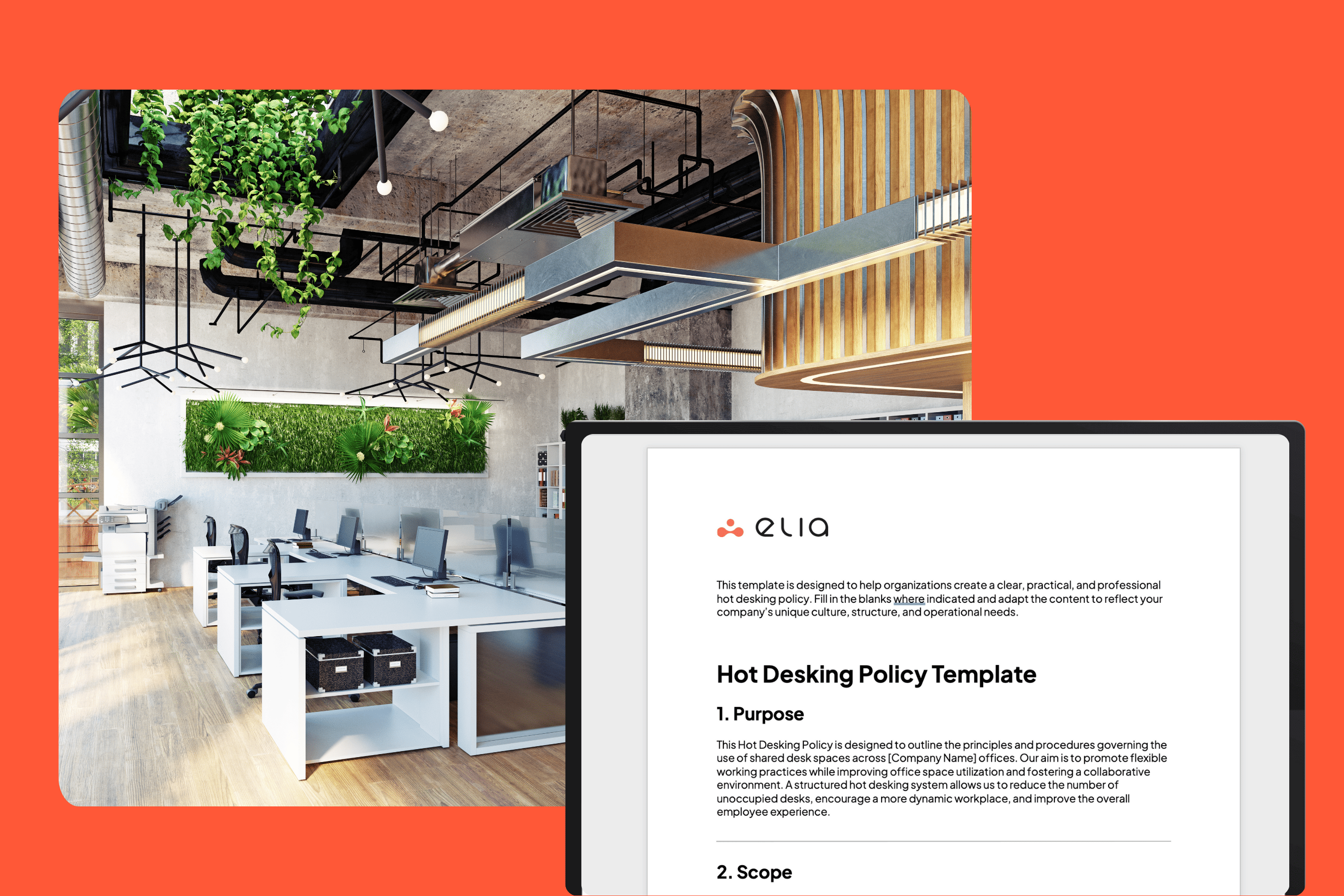Hot desking can transform the way we use our office space. It gives employees the flexibility they want and helps office managers save space and manage desk assignments more efficiently. But to make hot desking work, we need a clear, simple, and fair hot desking policy.
In this guide, we’ll walk you through how to customize a hot desking policy template for your workplace, share best practices, and help you avoid common pitfalls. You’ll also find a free downloadable template, ready to adapt to your needs.
Download Your Hot Desking Policy Template
How to Customize This Template for Your Workplace
Creating a policy is one thing, but making it work for your specific team and office is another. Here’s how to start.
Consider Your Office Layout and Team Size
Do you have enough desks for your team on a given day? If not, desk sharing or alternating in-office schedules might be necessary. You might also want to split your office into zones, quiet work areas, collaboration zones, or team-based sections.
You’ll also need to decide: how many desks are shared desks vs permanently assigned desks? If some employees have specific desk needs (equipment, adjust screens, special chairs), consider exceptions.
Adapt the Policy to Match Your Work Culture
A good hot desking policy reflects how your team actually works. If people already work flexible hours or follow hybrid schedules, build that into your guidelines.
Encourage feedback and collaboration during the rollout. Policies work best when employees feel heard, and when they understand why the change is happening.
Assigning Responsibility
Hot desking isn’t just about choosing a desk. There are responsibilities on both sides, yours and your employees’.
Role of Office Managers and HR Team
Office managers and the HR team are key to implementing a smooth desk sharing experience. They should oversee the desk reservation system, track office space utilization, and support any employee concerns.
They are also in charge of assigning working spaces when necessary, making sure there are enough desks, and updating the policy as needs evolve.
Guidelines for Employees Working Remotely Part-Time
If your team includes employees working remotely on an as-needed basis, make it clear how and when they should book desks. A rotating basis or first come, first served system works well.
You should also address what happens if someone doesn’t show up for a reserved desk or leaves a desk unoccupied for extended periods.
Establishing Clear Desk Usage Rules
Desk usage rules are the backbone of any good hot desking policy. Be specific:
- Keep desks tidy and clear of personal items
- No permanent personalization or decorations
- Use personal lockers or digital storage for belongings
- Handle confidential documents and calls with care
Best Practices When Implementing a Hot Desking Policy

Desk Booking Systems and Mobile Apps
A modern hot desking system makes everything easier, for everyone.
Use a desk reservation system (ideally with mobile apps) so employees can book desks, meeting rooms, or collaboration zones in advance. You can go with a first come, first served approach or create assigned time slots.
This also helps you track which desks are used most often, and which stay unoccupied.
Hot Desk Etiquette and Office Culture
The etiquette around hot desking matters. We want to maintain a clean, collaborative environment without micromanaging.
- Keeping desks tidy isn’t optional, it’s respectful
- No personal items or decorations left behind
- Confidential documents should never be left on desks
- Take confidential calls in designated areas
- Respect others' space, even when using uniform desks
Managing Personal Storage and Privacy
Without a specific desk, people need other forms of storage. Personal lockers work well. You can also encourage digital-first habits for document management.
Make sure employees know how to adjust screens and chairs to their preferences when they arrive at any available desk. Consider providing headset docks or adjustable chairs as needed.
If people handle confidential documents, clearly outline privacy expectations and offer guidance.
Challenges of Hot Desking and How to Overcome Them

Lack of Personalization or Belonging
One of the most common challenges is the lack of personalization or belonging. A rotating system can make it difficult for employees to feel connected to their workspace. To overcome this, encourage light personalization—allow small, non-permanent items like a mouse pad or a photo. Support a stronger sense of community through team rituals, shared spaces for lunch, and frequent check-ins. Employee feedback and HR support are essential to making people feel supported.
Hygiene and Health Considerations
Hygiene and health concerns are another top priority. Since different people use the same desk throughout the week, sanitation becomes critical. Provide easy access to cleaning supplies like hand sanitizer and wipes, post reminders about cleaning shared desks, and implement a schedule for regular professional cleaning. Remind employees to wipe down computer screens, keyboards, and surfaces before and after use.
Tech and Equipment Management
Finally, technology management can be a sticking point. It’s frustrating to arrive at a hot desk without the necessary tools to work. Each desk should be properly equipped with consistent software, docking stations, screens, and phones. Clear instructions for setup, access to IT support, and uniform desk configurations can dramatically reduce friction. When the tech works, the system works.
Ready to Simplify Hot Desking?

Once your hot desking policy is set, the real work begins, implementing it efficiently.
That’s where elia comes in.
elia is a smart, user-friendly hot desking system built to support flexible working, desk sharing, meeting room booking, office space optimization, and more. It’s ideal for companies looking to:
- Book desks on a first served basis or rotating basis
- Manage meeting rooms with ease
- Improve office space utilization and employee experience
With elia, office managers, HR teams, and employees all stay aligned. Desk reservations are seamless, desk usage rules are easy to enforce, and your workplace runs smoother, without the guesswork.
Book a demo with elia to see how we can help bring your hot desking policy to life.


.png)

![Hot Desking vs Activity-Based Working: The Comparison Guide [2026]](https://cdn.prod.website-files.com/64f88f68249f7cafe071d150/6983b914d7fa26ca621795b6_160.png)
.png)